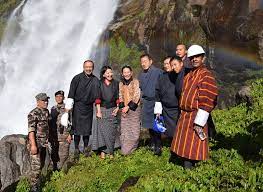Embracing Change: Bhutan’s Journey Towards Renewal
In a candid conversation with Bhutan’s former prime minister, Lotay Tshering, in August of last year, the nation found itself at a critical juncture post-pandemic. Tshering revealed the nation’s resolve to overhaul its systems across various sectors, from tourism to banking, and from corporate affairs to the judiciary. With the monarchy steering the nation’s course, the new government, led by Prime Minister Tshering Tobgay, seems poised to maintain this trajectory. Tobgay’s proclamation on social media shortly after winning the general elections in January underscored this determination: “Bhutan is open for business!”
The Gelephu Mindfulness City Project: A Beacon of Hope
At the heart of Bhutan’s revitalization efforts lies the ambitious Mindfulness City project in Gelephu. King Jigme Khesar Namgyel Wangchuck unveiled this project during his national day address in December, signaling a significant commitment to its development. Crucially, India’s involvement is instrumental in realizing this vision, with contributions ranging from airport infrastructure to railway connections and the emergence of new businesses within the city. Bhutan’s strategic orientation towards India for economic and developmental endeavors is unmistakable, with the Gelephu special administrative region serving as a clear testament to this alignment.
A Strategic Development Agenda
The development strategy outlined by Dorji Dhradhul, Director General of the Tourism Department, emphasizes three key priorities: the expansion of the energy sector, enhancing physical and digital connectivity, and fostering skill development among the populace. Encompassing an expansive area of over 1,000 sq km in eastern Bhutan, the Gelephu economic hub aspires to prioritize sustainability and well-being. The king’s vision for this hub emphasizes its autonomy in formulating laws and policies, alongside executive and legal independence. With plans to establish an economic corridor facilitating trade with Southeast Asian nations via India, the project boasts an impressive roster of collaborators, including the Danish Bjarke Ingels Group (BIG) and renowned engineering firms.
Aligning Business with Bhutan’s Values
Despite its invitation to investors, Bhutan remains steadfast in ensuring that businesses operating within the special administrative region uphold the principles of the country’s Gross National Happiness philosophy. This commitment entails welcoming only those enterprises whose objectives align with the promotion of well-being, sustainability, and community cohesion. Notably, industries such as weapon manufacturing, incompatible with Bhutan’s ethos, are explicitly excluded from participation. This principled stance extends beyond the SAR to encompass the entire nation, reflecting Bhutan’s dedication to preserving its environmental and cultural heritage.
Challenges and Opportunities in Bhutan’s Economic Landscape
Bhutan’s recent graduation from the United Nations’ list of least developed countries in December 2023 marks a significant milestone. However, the nation continues to grapple with the repercussions of a stagnant economy and a pronounced brain drain, particularly among its youth. The allure of better academic and employment prospects abroad has led to a substantial exodus, prompting a sober reflection on the nation’s future trajectory. The Gelephu SAR emerges as a pivotal initiative aimed at addressing these challenges by offering avenues for economic growth and skill development, with a clear emphasis on fostering a conducive environment for the return of talented expatriates.
Tourism: A Catalyst for Economic Renewal
Bhutan’s distinctive approach to tourism, characterized by high value and low volume, has garnered international acclaim. The nation’s pristine natural landscapes, coupled with its commitment to sustainable tourism practices, have positioned it as a premier destination for discerning travelers. Despite initial hurdles posed by stringent policies, recent adjustments, including a rollback of the Sustainable Development Fee, have revitalized the tourism sector. Investments from renowned hospitality brands and the relaxation of airfare for SAARC nationals further underscore Bhutan’s commitment to fostering a thriving tourism industry.
Forging Stronger Ties with India
Situated between India and China, Bhutan’s economic fortunes are closely intertwined with its southern neighbor. India remains Bhutan’s largest trading partner, with bilateral trade witnessing significant growth in recent years. The Gelephu Mindfulness City project exemplifies the depth of collaboration between the two nations, with India extending crucial support in infrastructure development and connectivity enhancement. Bhutan’s proactive stance in welcoming multinational businesses underscores its commitment to fostering economic prosperity and strengthening bilateral ties with India.




